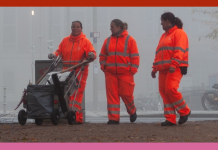Neurodiverse professionals offer a mass of untapped potential in the workplace as fresh thinkers who bring unique and powerful perspectives to technology
Sparta Global’s 2023 EqualTech report explored how neurodiverse professionals bring in-demand perspectives to tech, but revealed further insights into the state-of-play for neurodiverse people and employment – a demographic in evolution. In this article, David Rai, Sparta Global CEO, explores how society is currently supporting – and failing to support – the valuable progression of neurodiverse careers in areas where there are significant skills gaps.
In a vision outlined in the government’s Transforming for a Digital Future Strategy, by 2025 the UK government aims to be a transformed, more efficient digital government.
Yet a lack of skilled tech talent – with labour supply and employment below pre-pandemic levels – and a fiercely competitive hiring environment, threaten the progression of the government and wider society’s goals for a digital economy. With such a significant skills gap, the neurodiverse community offers a mass of untapped potential with fresh thinkers who bring unique and powerful perspectives to technology.
An under-served community
With the UK government reporting that we could face a shortage of 900,000 skilled IT workers by next year, the neurodiverse community presents perspectives and skills that could be transformative. The biggest deficits in technology are expected to be in strategically important and rapidly expanding areas such as data analytics and IT services implementation – areas where responsibilities pair up with the abilities of a number of neurodiverse people.
A new report published by Sparta Global explored how neurodiverse professionals bring in-demand perspectives to tech and broke down the specific skills neurodiverse professionals traditionally bring to the table. Computational thinking, questioning how things are done, imagination, intuition, and innovation – are just some of the traits applicable to individuals with conditions such as autism, ADHD, and Dyslexia.
Conversations around women and ethnic minorities in technology have rightfully been at the forefront of diversity and inclusion activity in recent years. Companies have proactively rethought their hiring policies and adapted working cultures to be more accommodating. But is there enough positive action happening around less visible diversities, such as the differences between how people’s brains work?

Stigmas vs. skills in the workplace
While some organisations recognise the powerful potential of building teams of people with neurological differences, stigmas and miseducation around neurodiverse communities are still rampant. Sparta’s report, which surveyed 500 senior employees and C-suite executives working in organisations across almost every industry sector in the UK, also found that most employers are not deploying inclusive hiring techniques to enable neurodiverse applicants to progress.
Just 21% of respondents said they worked for businesses that tailor their recruitment practices to neurodivergent candidates, meaning almost four in five have taken no action.
A big majority (83%) of the workers surveyed who identify as neurodivergent reported feeling worried, nervous or fearful about having conversations with their employer regarding their neurodiversity.
Fifty-nine per cent of those respondents felt there wasn’t enough support available in their organisations, and feared disclosing their neurodiversity may have negative repercussions on their career.
Diversity builds better teams
Despite the challenges surrounding employment for neurodiverse professionals seeking work, positive action is beginning to occur. Sparta’s research found 87% of digital leaders believe neurodiversity will be a top priority for their companies in 2023, while 54% stated that COVID-19 accelerated conversations around commitment to neurodiversity and wider employee inclusion.
Diverse hiring and positive action is not only the right thing to do to promote inclusion – but is also an intelligent business decision that provides compelling competitive advantages. Neurodiversity inclusion can help tech employers drive innovation, performance, and productivity. Having people who see things differently, ask non-linear questions, and provoke conversations around accessibility, enables organisations to build products and services that will be viable for far wider audiences and skillsets. This is critical for businesses to succeed and society to be well-served.
The neurodiverse population demographic in evolution
Neurodiversity awareness is on the rise. However, awareness doesn’t always translate into action, and organisations are largely not moving fast enough to remove existing barriers to entry for neurodivergent talent. This is increasingly time-critical as the neurodivergent communist is a demographic in constant evolution. Of those surveyed by Sparta Global who identified as neurodivergent, only 26% were diagnosed during childhood, while 31% were diagnosed as adults. A further 15% stated that they were currently undergoing a diagnosis, while 28% were planning to seek an assessment in the future.
Whilst the government has made commitments to carry out our vocation profiling, engage with employers and provide in-work support for further career development for neurodiverse professionals – educators and employers must make immediate changes. Immediate actions such as assessing the use of language across job advertisements, exploring new inclusive mechanisms across interviews or assessments, and making a menu of reasonable adjustments available, could be the difference between actively excluding neurodiverse individuals and accommodating, supporting, and encouraging an entire community to succeed in your area of business need.
Written by David Rai, Sparta Global CEO











